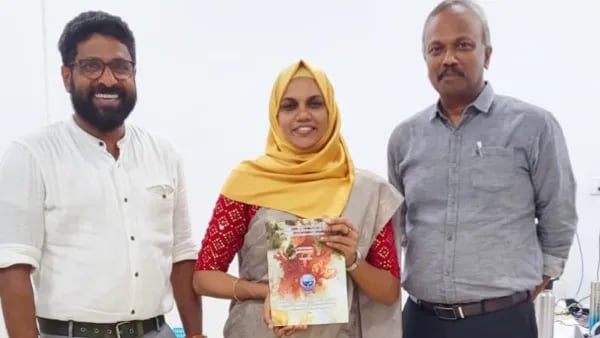‘Why study?’: Lakshadweep’s first woman PhD holder in marine sciences was once asked
In a befitting reply to naysayers, Shabeena M – who would not dare dream of doing higher studies as a child – successfully defended her thesis on macroalgae on November 5, 2024 and was felicitated by the Lakshadweep administration.
TRENDING


“What will you, as a woman, do studying aquaculture and microbiology?” was the repeated question that Shabeena M, 35, would encounter during her college days growing up at Androth, one of the inhabited islands in the Union territory of Lakshadweep.
On November 5 this year, she successfully defended her thesis titled ‘Zonation patterns, composition and diversity of macroalgal communities in the Lakshadweep Archipelago’ and has become the first woman from Lakshadweep to earn a PhD in marine sciences – a befitting reply to all the naysayers. Shabeena was felicitated by the Lakshadweep administration for her achievement recently.
“After post-graduation, my first job was as a teacher of fisheries at a local school during 2014-2015. Due to limited exposure and knowledge of available opportunities, PhD was never on my mind,” Shabeena told The Indian Express over the phone from her home in Kavaratti.
Her childhood years were challenging, she recalled. Losing her father – the family’s lone breadwinner – while studying in class 4 and the family’s subsequent shrinking resources meant that she could not dare dream of continuing higher studies at Kochi in Kerala – about 500 km away on the mainland. But nothing deterred Shabeena’s focus in studies which she continued at the island till her post-graduation. During the first year of post-graduation in 2012, she got married to a sailor. Today, she is a mother to a six-year-old girl.
It was under the mentorship of Idrees Babu K K, a marine scientist at the Department of Science and Technology (DST) in Lakshadweep, that Shabeena learned about the call for PhD and received his guidance for the interview preparation. Before that, she used to be a DST team member working in Lakshadweep who was tasked with documenting the various local faunal resources.
There was nobody to inform or guide me about the possible opportunities in this field during college days. I was under-confident, scared, and never thought that I possessed talent or could compete. If it were not for my two encouraging and supportive guides, Idrees Babu and Sureshkumar, I would never have enrolled for PhD,” she said.
S Sureshkumar was Babu’s PhD guide at Kerala University of Fisheries and Ocean Studies (KUFOS) – the country’s first fisheries university. He later guided Shabeena when she registered for PhD in 2016. Her actual groundwork started in 2017.
Shabeena’s research required her to travel to nearby islands of Lakshadweep either by a vessel or via ship for collecting samples of seaweeds and seagrass. Her core work was to document these species presently thriving in 12 islands of Lakshadweep, two of which are uninhabited. Recalling her PhD journey through the travels to the mainland that would require one or, sometimes two days, she said, “During my initial years of PhD, I, along with my infant daughter, would travel by ship to Kochi and stay over for one to two months. In between these trips, I would take up thesis writing both in Kochi and back home. My family was very supportive. In the later years when my daughter started her school, my mother helped with caregiving.”
Her extensive work over the past several years concluded that only 96 of the earlier 182 documented algal species in Lakshadweep have survived. Of those, seven were documented in Lakshadweep waters for the first time. A herbarium has been newly set up here and her work is being seen as baseline research on these algae species.
“Shabeena’s research work suggests that only those species have survived which could be resilient to the ongoing anthropogenic and other changes that have affected the region,” said Sureshkumar, a professor of marine biology at KUFOS.
Dredging and a large number of turtles feeding on the algae were other possible reasons, Shabeena pointed out, for the declining extent of seaweed and seagrass in Lakshadweep. “I recall seeing vast swathes of seagrass many years ago but that is now on the verge of depletion,” she shared.
Shabeena’s grit and dedication to study the local ecology of Lakshadweep is an ideal example for the young islanders to follow suit, Sureshkumar said.
“There have been many studies taken up to study Lakshadweep’s fauna over several decades. However, these were done mainly by researchers from the mainland who would make some visits to Lakshadweep and come up with findings. Now, with a native researcher like Shabeena trained and qualified, this will be a big boost to all efforts towards community-level capacity building locally for studying the exclusive marine life of Lakshadweep,” said the KUFOS senior professor.
Shabeena, who arrived back home after her PhD defence in Kochi, received a hero’s welcome. “Sailing back, many of my co-passengers congratulated me. Since I arrived home on Sunday, my classmates and relatives have been queueing up at home to greet me. They are all feeling proud of my achievement and I am enjoying this moment. Nothing can stop women from making progress,” she said.
Shabeena has ambitious plans, including furthering her present research by studying the DNA of the same algae and tracing the changes they have undergone. She added that she will consider teaching positions at her alma mater when a suitable vacancy comes by.
